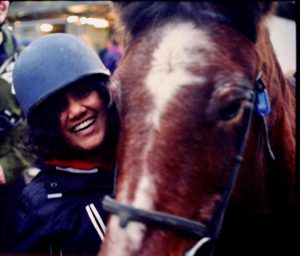
At the moment, I have the great privilege of a year’s research leave from my job in the Law School. It is wonderful to be able to make some progress on a number of projects which have been gathering metaphorical dust during the last couple of years, during the constraints of the pandemic and the challenges of life and teaching in this period. So far, I have spent time working on ‘bastardy’ and ‘petty treason’, and will be writing up that work more formally later in the year. Now, though I am turning my research energies in another direction, looking at the medieval appeal of mayhem. As I do so, I thought it might be appropriate to write a quick blog post giving an outline of the area, and a few thoughts on why I think this is something worth examining.
So … explain the appeal of mayhem
Well, the appeal of mayhem was a legal action like this one, from a 1491 legal record, in which (to summarise) Walter Chapman prosecuted Thomas Preston and three others for having attacked him with staves and ‘clubbes’, hitting his legs (specifically his lower legs) and causing him to ‘lose the use’ of them. Assuming that there was such an attack, Walter, clearly, survived it (he alleged that it had happened ten years before). Now, he was seeking compensation for his injuries.[i]
The appeal of mayhem was a particular sort of legal procedure, for a particular sort of non-fatal injury. It was not an attempt to overturn a decision (a more modern understanding of ‘appeal’), but an individual prosecution. This appeal procedure was available in relation to serious criminal offences, including mayhem. The consequence of a successful appeal of mayhem was, a financial penalty, and a compensation payment to the successful accuser, though sources from the thirteenth century onwards are rather fond of noting that, in even earlier law, the principle of ‘member for member’ applied, condemning the convict to a mutilation fitting the crime.
So much for ‘appeal’; what is ‘mayhem’? It is now a word with a broad scope. It can suggest general violent disorder. Sometimes it is also used in a slightly softer sense, to indicate fictitious and twee transgression (see the sneering term ‘Mayhem Parva school’ for rural murder mysteries). Moving even further to the unthreatening end of its spectrum of meaning, it doesn’t strike us as inappropriate for use in the naming of the house band on The Muppet Show (Dr Teeth and the Electric Mayhem for anyone not versed in high culture), or a contestant on RuPaul’s Drag Race (one Mayhem Miller – thank you, internet). For the legal historian, however, the word also has a very specific meaning – a particular sort of non-fatal injury.



